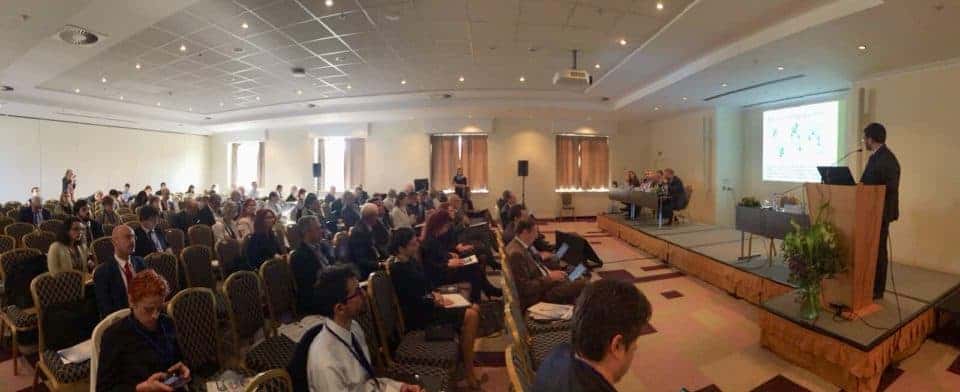Messages from Brussels: more biofuels for transport are badly needed and can be produced sustainably
Several international initiatives and organizations met in Brussels to discuss the need and the ways to scale up low carbon fuels in transport. The international conference, titled “The role of low carbon fuels in decarbonising transport: the emerging consensus from international initiatives”, was a collaboration between the Biofuture Platform, the European Comission, IRENA, below50 and ART Fuels Forum, with the participation of IEA and FAO. It took place in Brussels, Belgium, April 10 to 11. While global in nature, the conference in Brussels focused on the European context and upcoming biofuels policy framework. It comes at a moment when European legislators and national representatives are debating the contours of the new targets and policies for the transportation sector and renewable energy – to be approved as part of the Renewable Energy Directive for the post 2020 period, RED II.
The Conference produced key messages about the vital role of sustainable biofuels and ways to promote them. Among these are that massive scaleup of bioenergy is needed to help combat climate change, feedstocks are available to meet the bioenergy need sustainably, conversion technologies are also available to meet the need, policy support and international collaboration will be required to ensure investment in bioenergy scaleup, and an evidence-based approach is needed to ensure sustainability.
The need for a sustainable scaling-up of bioenergy to combat climate change was a vital point of the conference. For this to happen, policy support and investments will be required, including evidence-based ways to reward the positive externalities offered by low carbon fuels, as well as specific support to reduce the costs of innovative conversion technologies at industrial scale, such as second generation plants.
Regulatory issues were also stressed in the discussion. An evidence based, feedstock neutral approach which objectively assesses sustainability and environmental performance (as adopted in California´s Low Carbon Fuel Standard and Brazil´s RenovaBio) was recommended above arbitrary regulatory distinctions, such as the division between conventional (food crop based) and advanced (non-food crop based) biofuels, as such a division could impede innovation and the development of both, and may not produce the best outcome. In the same vein, an active policy approach to minimize the risk of emissions from indirect land use change resulting from biofuels production (a concept know as “ILUC”) was deemed preferable to a more pessimistic approach based on modeling long term scenarios.
See the full extent of the key messages out of the outcome document of the conference (PDF version):
KEY MESSAGES
Massive scaleup of bioenergy is needed to help combat climate change.
Bioenergy is a vital component of our efforts to decarbonise energy production and limit global temperature rise. It is the largest renewable energy form in Europe and globally. Despite expected electrification of light vehicle fleets over the next several decades, large numbers of vehicles will still rely on petroleum fuels which biofuels and other low carbon transport fuels could displace. Aviation, marine and heavy freight transport ares difficult to electrify and will require the energy density that low carbon fuels can provide.
Feedstocks are available to meet the bioenergy need sustainably.
Large volumes of feedstock for biofuels can be provided sustainably, without impeding food production or releasing carbon through land-use change. A combination of smart agricultural practices, waste and residue policies, high-yield energy crops and the reclamation of degraded or fallow land can provide both the volumes and the high-quality carbon emissions reductions that the world needs.
Conversion technologies are also available to meet the bioenergy need.
Various new conversion pathways for low carbon transport fuels are under development within Europe and abroad. Second generation technologies have achieved large-scale demonstration or early commercialization, with a few first-of-a-kind industrial scale plants operational. To scale up capacity, further investment is needed at levels beyond current trends. The policy framework needs to provide a market incentive for those technologies to overcome the “valley of death” and achieve full commercial operation, realize efficiencies of scale and help close the price gap between low carbon and fossil fuels.
Predictable, long-term policy support will be required to ensure bioenergy scaleup.
Regulatory and policy support is required to ensure the reliable supply of low carbon transport fuels. This support can take the form of a relevant market price for carbon emissions reductions, volumetric targets, or a combination of the two. Support is also required to reduce the costs of innovative conversion technologies and bring them to industrial scale, as the capital costs of such technologies can be cut in half once several pilots are built. To be effective in eliciting investment, in view of the long period required for commercial operation, support frameworks should be reliable and predictable.
An evidence-based approach is needed to ensure biofuel sustainability.
The most effective way to reduce the costs and carbon emissions of biofuels is to reward reductions in carbon emissions per unit of energy produced. The preferred approach is to assess and stimulate those feedstocks that have higher yields and those processes that are most cost, energy, and carbon-efficient. Aside from specific support to promote new technologies (see items above), regulatory distinctions between conventional and advanced biofuels, or between food and fuel crops, may not produce the best outcomes as low-emission, cost-effective approaches to low carbon fuel production often involve a mix of feedstocks and conversion processes.
Some sustainable low carbon fuels combine advanced and conventional elements.
Regulatory distinctions between conventional (food crop based) and advanced (non-food crop based) biofuels may impede the development of high-performance biofuels which are both. For example, Brazilian energy cane doubles sugar cane biomass yields, so it has very low risk of inducing carbon emissions through land-use change and can provide biomass feedstock at low cost. Its processing to ethanol combines “first generation” processing of the sugar component and “second generation” processing of the cellulosic portion.
Regulations should adopt a transformative approach to Indirect Land Use Change (ILUC).
Indirect Land Use Change (ILUC), while an important environmental concern and a key driver in European regulatory deliberations, is impossible to measure and hard to model. Thus, regulations should attempt to steer investors towards options with low risk of ILUC, such as biofuels made from farm or forest residues, feedstocks grown on degraded land, or feedstocks with very high yields. Such options are abundant in Europe and globally. Good policies can drive positive change and prevent ILUC, instead of assuming it.
International collaboration can accelerate sustainable bioenergy uptake.
Countries should cooperate to share knowledge on sustainable bioenergy options and effective policy approaches to putting these options in place. They should also work together to build consensus on the environmental, social and economic sustainability of bioenergy and the contribution they can make to Sustainable Development Goals such as sustainable energy for all, adequate nutrition for all, and combatting climate change. Based on such consensus, they should encourage financing of projects and programmes in developed and developing countries to jointly boost food yields and sustainable low carbon fuel production.
Source: Biofuture Platform


